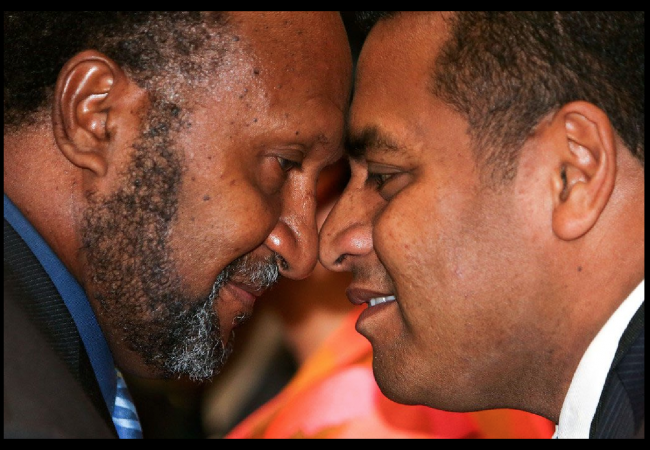
Political forum wrap-up
Almost 70 MPs and political leaders from across the Pacific participated in the inaugural Pacific Parliamentary and Political Leaders Forum held in Wellington, New Zealand between April 18 and April 22.
The idea of the forum was first posited in 2010 when a recommendation was made by New Zealand’s Foreign Affairs, Defence and Trade Committee to hold such an event in order to ‘promote stronger governance, cooperation and political cohesion amongst new and emerging political leaders from the Pacific region and to strengthen relations with NZ parliamentarians.’
During the forum, World Bank Economist, Tim Bulman told leaders that enabling a business-friendly environment would be essential to regional success, arguing that, ‘Neoliberalisation has brought significant benefits, but regulation is still needed. It’s just a matter of the right regulation.’ However, Pacific island delegates rejected the push to free up trade, preferring to commit themselves to sustainable development, sound governance and preservation of cultural identity and sovereignty. Key opponents to elements of the models proffered by Bulman included PNG Governor of Oro Province, Garry Juffa, Vanuatu MP Ralph Regenvanu, Fiji National Council of Women general secretary, Fay Volatuba, Samoan cabinet minister Fiame Naomi Mata’afa and Guam Republican Minority Whip Thomson Morrison. Meanwhile, New Zealand Green MP Kennedy Graham questioned the compatibility of traditional concepts of economic growth with efforts to combat climate change. Senior New Zealand Labour Maori MP Shane Jones also warned Pacific parliamentarians to seriously consider the sustainability of their fisheries.
West Papua was part of the forum’s official agenda and received no mention in the forum’s ‘call to action’ document, but it received attention during the forum nonetheless. In a New Zealand Parliamentary debate as the forum began, NZ Green Party MP, Metiria Turei urged New Zealand and all Pacific governments to provide leadership on the West Papua issue by acting as mediators and by calling on Indonesia to end the ban on independent journalists in the province. At the forum itself, fellow Green MP Catherine Delahunty used an introduction to a healthcare speech to bring up the conflict, and encouraged Pacific leaders to allow West Papua into the Melanesian Spearhead Group, and the Pacific Islands Forum.
Governor of Oro Province in PNG, Garry Juffa brought further attention to the plight of West Papua, strongly condemning New Zealand for ignoring the violence and questioning the region’s commitment to the issue.
The event ended with a ‘call for action’ and forum participants recommending that their respective Parliaments should:
– Take steps to increase Pacific women’s representation in Parliaments and to empower them to be active in all aspects of society, including governance and business.
– Adopt strategies to meet the challenges arising from climate change, involving urgent and effective action in mitigation, adaptation and financing including placing a higher reliance on renewable energy.
– Foster a free, professional and independent media to promote democracy and an open and transparent society. Media has and continues to have an important role to play in ensuring political accountability. Participants remarked on the rise of social media in the Pacific and its utility as a communication tool, particularly in remote communities.
– Promote effective leadership and creative engagement between parliaments and the communities they represent.
– Explore ways to improve the delivery and creation of services in small, isolated communities, including through better infrastructure and information technology.
– Prioritise primary healthcare, health promotion and disease prevention. Work to educate their communities on the importance of healthy lifestyles and to raise awareness about reproductive and sexual health. Ensure cost effectiveness and good management to sustain affordability of healthcare.
– Improve and promote economic conditions to facilitate trade and investment in a manner that ensures sustainable development in the interests of the Pacific while still retaining cultural identity and sovereignty.
– Acknowledge that sound governance from our Parliaments is essential to expand sustainable businesses and to create jobs, especially for young people.
Auckland University of Technology’s Pacific Media Centre covered the conference via its live blog (http://www.pmc.aut.ac.nz/pmc-blog/michael-sergels-live-blog-pacific-political-leaders-forum) and reported on several major stories during the course of the five-day conference.
> PNG politician condemns NZ for ignoring ‘deadly conflict’ in Papua
> Vanuatu minister calls for ‘enshrining’ of custom land tenure to protect Pacific
> MPs apologise to Pacific over NZ failure to sign climate change pact
> NZ committed to Pacific neighbours, MPs tell island leaders
> UN community ‘genuinely concerned’ over Pacific women’s rights, says Kedgley
> Micronesian senator praises Louisa Wall for ‘equality chance’ bill
> Samoan minister calls on NZ to rethink ‘easier’ Pacific migration
> ‘Hypocritical’ NZ told to stop fatty food exports to Pacific
> Views clash over impact of ‘self-censorship’ in Fiji
> Niue politician blames family planning experts for ‘depopulation’ threat
> Pacific leaders want action on gender equality – but divided on urgency
> Pacific women political representation not good enough, says Fiame
> PNG governor accuses UN experts of lying about gender ‘thuggery’
> More women in power is Fiji advocate’s recipe for no coups
